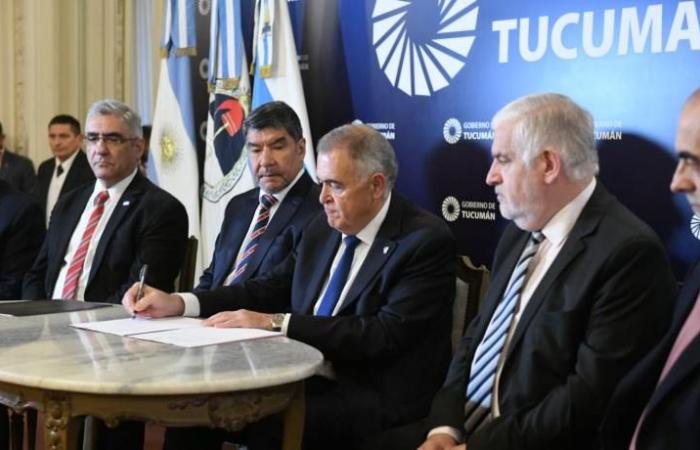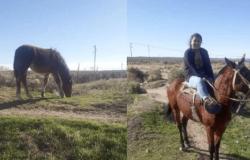The governor Osvaldo Jaldo This Friday he led the signing of an agreement between the Superior Government of Tucumán and the National Agri-Food Health and Quality Service (Senasa). The agreement aims to form an institutional network to promote the development of the quality of livestock raw materials, the promotion of hygienic and safe practices and food safety.
Furthermore, this initiative that seeks to protect and improve public health, aims to integrate all the actors involved in the agri-food chain from primary production to the final consumer, establishing an effective interrelation between the public and private sectors.
The lieutenant governor accompanied Michael Acevedo; the president of Senasa, Pablo Cortese; the Secretary of Bioeconomy, Fernando Vilella; the Undersecretary of Agricultural and Forestry Production, Sergio Iraeta; the president of the Argentine Northwest Citrus Association (ACNOA)Pablo Padilla; representatives of the National Institute of Agricultural Technology (INTA); The ministers Luis Medina Ruiz of health, Regino Amado of Government and Justice, Federico Masso of Social Development, Eugenio Aguero Gamboa of security, Daniel Abad of Economy; the State Attorney, Gilda Pedicone de Valls; the Secretary of Production, Eduardo Castro.
For the Governor, “this agreement summarizes the work we have been doing in these first six months of government, jointly in many areas between the Nation and the Province.”
In his speech, Jaldo stressed that the initiative is fundamental for Tucumán because it is a producing province that relies on regional economies. “The support of SENASA, Inta and many areas of the National Government makes it easier for us because today, as a result of our exports, we are in almost 150 markets around the world. This means that our products are going to go out and we have to meet certain phytosanitary conditions. “, held.
And he highlighted the importance of joint collaboration to guarantee that local products meet the necessary standards for domestic consumption and competition in the global market: “Our products reached the most demanding markets in the world, a product of the joint work that came doing from the productive sector, which has been done with the province and national departments, which are the ones that certify, accompany us, teach us how and in what way the products should be carried so that they can go out into an increasingly competitive world.” .
In his speech, the governor recognized the investments made by Tucumán businessmen in the creation and modernization of meat processing plants, highlighting that these efforts are crucial to confront the current economic and financial situation. Furthermore, he emphasized the importance of collaboration between producers, the provincial and national governments to continue improving in areas of sanitation and the environment, stressing that progress in these aspects is a shared effort. “The producer cannot do it alone, we have to do it with the provincial government and the national government,” he concluded.
Abad said: “Tucumán is the first province to sign the agreement. It has to do with phytosanitary issues, with the issue of meat, refrigerators, in order to standardize consumption. That Argentines, especially those from Tucumán, consume with the quality that is exported. And in that there is important work that has to do with the quality that is exported” and he said that with SENASA “we are going to continue working in other areas of importance for the regional economy.”
“This is raising the quality standard of what we Tucumans consume. And this is very important, because Senasa has high standards, and that guarantees that what we consume has very good quality,” Abad concluded.
Secretary Vilella said: “this is the first province to begin this cycle of agreements. There are others that are being worked on. Being the first precisely marks the relevance it gives to the Tucumán government in caring for its productive system and caring for the inhabitants of the province. If one does not have the necessary standard, one cannot access the markets, one cannot even move to another province. And, on the other hand, that the consumer has access to the best quality of meat, with safety and that has had an adequate cold chain.”
Cortese explained: “Senasa has, as the secretary just said, fairly high standards. We must train provincial officials, the technicians who work in the refrigeration institutes, the heads of services, improve the facilities to ensure food safety and quality, and then also be able to provide food security to all residents of Tucumán and the rest of the country. This agreement begins immediately.”







